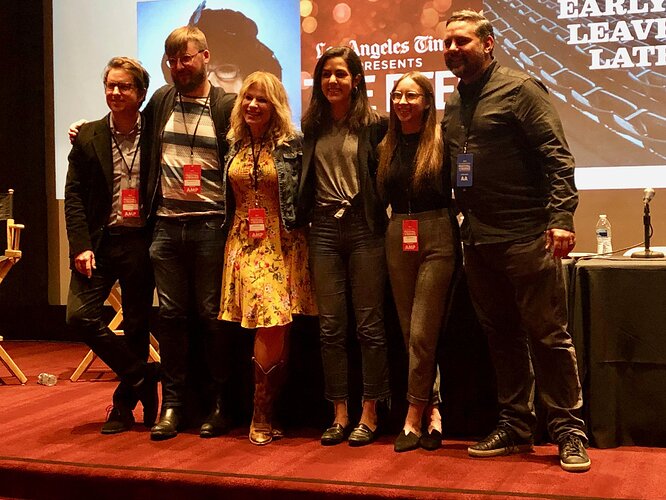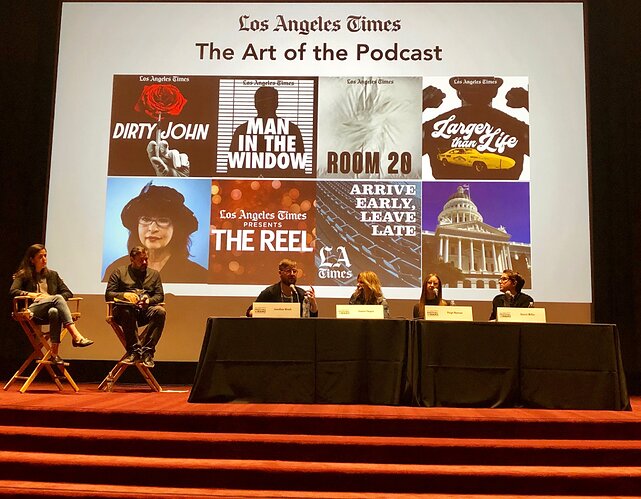Originally published at: THE ART OF THE PODCAST PANEL - People of Con
LA Times Festival of Books 2019
Author: Christopher Edelen
In recent years, the Los Angeles Times Festival of Books, put on at USC’s main campus, has branched out to include and celebrate other mediums: everything from live music and spoken word to mobile art galleries built into the backs of trucks. The lineup for 2019 hosted several discussions and events surrounding a medium near and dear to my heart: podcasting.
Most of us know about big podcasts’ success, like Serial or Marvel’s Wolverine: The Long Night, but the form is still largely unexplored. At The Art of the Podcast panel, podcasters and producers working with the LA Times came together to discuss the future of podcasts in the greater media landscape. Well, that, and to show off some of their upcoming releases.
Moderators Clint Schaff (VP of Strategy and Development for the LA Times) and Camila Victoriano (Development Manager of Programming & Partnerships for the LA Times) spoke with producers and investigative journalists about what their work means for the genre.
Present at the panel were Jonathan Hirsch, the Executive Director of podcast production studio Neon Hum Media, and Paige Hynson works as a podcast producer for the LA Times. Additionally, Daniel Miller, a staff writer at the Times, and Joanne Faryon, an investigative reporter who teaches journalism at Columbia University, were on the panel.
All of these panelists came to podcasting from audio journalism and so were able to share a unique perspective on what the form can do for stories and news. Hynson expounded upon the benefits of having teams of veteran journalists and producers bring more consistently high-quality content. Faryon said podcasting allows more people to explore long-form journalism to tell a story rather than limiting it to the few voices who’ve been allowed to embed themselves in stories for years (think Hunter S. Thompson or Joan Didion).
Hirsch pointed out that, for him, the main difference is that the audience is no longer captive. As listeners, we aren’t just turning on the radio and listening to what’s on; we’re going into our apps and choosing what to listen to. Having moved to the other side of the microphone to start Neon Hum Media, he’s discovered that people choose to listen to a story that “makes them feel things,” pieces that communicate the facts and emotions.
One big difference that Frayon pointed out is having to be a character in the story. In her podcast, Room 20, about a man on life support for 15 years whose name nobody knew, she found that she was no longer telling the story as some authoritative news voice but instead was telling the story as herself. While producing Larger than Life, Miller added that the same question came up. For the first time, he’d had to explore his relationship to the story of Big Willie Robinson, a legendary street racer in LA.
So what does all this mean for me, the listener? It means that podcasting is putting the intimacy back into journalism. As podcasts gain popularity, big players like the LA Times and NPR are entering the space. But they won’t be bringing us more anonymous voices mechanically chewing through headlines in our ears.
Instead, they’ll be bringing us stories told from human to human. Someone we’ll come to know and love will sit on the other side of the campfire and tell us the story they’ve worked hard to uncover in stunning detail. And what’s more, they’ll tell us what these stories mean to them, so we can better decide what they mean to us.
Larger than Life, hosted by Daniel Miller, will be released soon. Room 20, hosted by Joanne Faryon, will be released on July 26, 2019. These and other podcasts from the LA Times studios can be found at latimes.com/podcasts.

